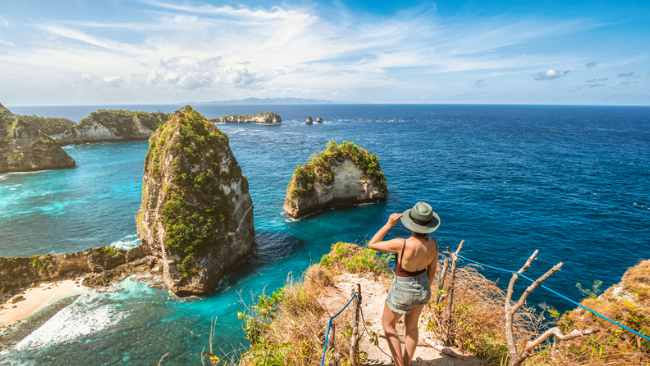What Is Bali Belly
To understand “What is Bali Belly” and its implications, you need to have a clear definition of it as well as grasp the common causes. In this section, we will introduce you to the meaning of Bali Belly and list the common causes of this ailment.
Definition of Bali Belly
Bali Belly is a digestive issue experienced by travelers visiting Bali or other Southeast Asian countries. It is caused by consuming contaminated food or water. Symptoms can range from mild discomfort to severe cases needing medical treatment.
To protect yourself, practice good hygiene. Wash your hands often. Avoid raw or undercooked food. Drink bottled water and be careful with ice cubes.
Usually, symptoms go away in a few days. But if they persist or you show signs of dehydration, get medical attention.
Bali Belly can disrupt your travel plans and make things uncomfortable. However, if you’re careful, you can reduce your risk.
A friend of mine contracted Bali Belly during their trip, even though they took precautions. It taught them to be extra vigilant when traveling and eating in foreign countries. Heed this warning and be mindful of Bali Belly – it’s not just the food that’s spicier than you’re used to!
Common Causes of Bali Belly
Bali Belly is a tummy trouble travelers often get when visiting Bali. It usually lasts a few days and brings on symptoms like vomiting, diarrhea, nausea, and cramps.
- The main reason for Bali Belly is eating contaminated food or drinking contaminated water.
- Being exposed to local bacteria and parasites through unclean places can also trigger it.
- Not practicing good hygiene such as washing hands often can be a cause too.
- Lastly, certain medications may not mix well with local bacteria or affect digestion.
To dodge a Bali Belly, you should only use bottled water for your drinks and brushing teeth. Also, make sure your food is cooked and served hot. Lastly, wash your hands regularly!
If you’re not careful, the only thing you’ll be bringing back from Bali is an upset stomach!
Symptoms of Bali Belly
To understand the symptoms of Bali Belly, delve into its common symptoms and severity. With this knowledge, you can identify if you are indeed experiencing Bali Belly and comprehend its level of severity.
Common Symptoms of Bali Belly
Bali Belly is an illness that tourists often get when visiting Indonesia. Symptoms differ from person to person.
Common ones include: nausea, vomiting, diarrhea, stomach cramps, fever, chills and dehydration.
Factors such as contaminated water or food, heat and stress can cause Bali Belly. To reduce your risk, stay hydrated, don’t drink alcohol or caffeine, and be mindful of what you eat and drink.
If your symptoms persist, seek medical attention. These symptoms are no joke, unless you find explosive diarrhea and a constant need for the bathroom hilarious!
Severity of Bali Belly Symptoms
Bali Belly is a common issue for travelers to Bali. Symptoms can vary from mild pain to serious pain and long-term diarrhea. It depends on how bad the symptoms are. They could need medical help or even hospitalization.
Headaches, nausea, fever, and chills can come with Bali Belly. Plus, excessive sweating and diarrhea can make the symptoms worse. To avoid it, drink bottled water and stay away from street food.
Most cases are mild and end soon. However, some people have bad Bali Belly for weeks. It leads to weight loss and feeling weak. If this happens, get medical help fast.
Once, a friend went to Bali. He got severe Bali Belly. He stayed in his hotel room for days and ate room service food. It wasn’t nice but he recovered when he went home, without any medical help. Avoid Bali Belly – bring Imodium and avoid street food!

Prevention and Treatment of Bali Belly
To prevent and treat Bali Belly with the utmost care, you need to be aware of a few things. The prevention methods for Bali Belly can help you avoid the unpleasant syndrome. When it comes to treatment, there are various options available for Bali Belly. In addition to traditional medicine, there are natural remedies for Bali Belly that you can also consider.
Prevention Methods for Bali Belly
To dodge an upset tummy when traveling to Bali, there are ways to stop and treat what locals call “Bali Belly.” Eat cooked foods. Wash hands before meals. Drink bottled water. Also, avoid raw fruits and veggies. Taking probiotics and staying hydrated can help boost immunity. To cure symptoms such as nausea or diarrhea, you can use over-the-counter medications like Pepto-Bismol for relief. If symptoms persist for more than a few days, see a doctor.
Garlic is a natural antibiotic. Mix crushed garlic with honey and add it to meals. This has been known to have antimicrobial effects on the gut. Another option is to drink ginger tea. This helps digestion and soothes an upset stomach.
Travelers often tell stories of stomach issues due to not being careful about food hygiene in Bali. One example is someone eating street food without thinking twice and feeling ill for the rest of the trip. This is a reminder to always practice safe food practices while travelling to evade illness like Bali Belly.
If you get Bali Belly, don’t despair. There are treatments. Just don’t expect them to be as enjoyable as a piña colada on the beach!
Treatment Options for Bali Belly
Treat Yo’self for Bali Belly!
When you’re out on your Bali travels and feeling not so great, here are some treatments you can try:
- Hydration: Drinking’ lots of water is key to getting’ rid of Bali belly.
- Medications: Over-the-counter meds like Pepto-Bismol and Imodium can ease mild symptoms.
- Natural remedies: Ginger and turmeric teas help with inflammation, while activated charcoal binds toxins in your gut.
- Probiotics: Supplements or foods with live cultures help restore healthy bacteria in your digestive system.
- Rest and relaxation: Taking it easy and avoiding physical activities can ease the symptoms.
If the condition persists or gets worse, seek professional help right away!
And according to CDC’s travel tips, travelers should avoid tap water, raw food, ice cubes made from tap water, and unpasteurized dairy products to lower the chances of gettin’ affected.
Skip the fancy cocktails and try these natural remedies for Bali Belly – your stomach will thank ya!
Natural Remedies for Bali Belly
Experiencing discomfort in the stomach during your Bali trip can be inconvenient. But, there are natural remedies that can help reduce symptoms of Bali Belly.
- Drink fluids with electrolytes, like coconut water or sports drinks, to replace lost liquids.
- Eat yogurt with live cultures to restore intestinal balance.
- Have plain rice, bananas, or applesauce to improve digestion and reduce inflammation.
- Refrain from consuming alcohol, caffeine, or spicy foods to minimize irritation in the gastrointestinal tract.
- Try turmeric tea or ginger tea to soothe the stomach and aid digestion.
- Don’t take anti-diarrheal medications unless advised by a doctor.
Prevention is key in combating Bali Belly. Remember to practice good hygiene and be careful when choosing food.
If you do have Bali Belly symptoms, seek medical attention if necessary. Make sure to keep your body hydrated.
A fellow traveler shared their experience of overcoming Bali Belly through natural home remedies like peppermint tea and lightly salted broth soup. They felt better after just a few days. It’s evident that certain home remedies work differently for different people, so find the right treatment for yourself.
To avoid Bali Belly, skip the street food and opt for bottled water and plain rice. Bali Belly is not worth a culinary adventure.
Diet and Nutrition for Bali Belly
To alleviate Bali Belly, a balanced diet is crucial. With the right foods, you can effectively reduce the symptoms of Bali Belly. In this section on ‘Diet and Nutrition for Bali Belly’ with ‘Foods to avoid during Bali Belly’ and ‘Foods to eat during Bali Belly,’ you can explore what to eat and avoid to conquer Bali Belly.
Foods To Avoid During Bali Belly
Suffering from Bali Belly? Need to make dietary changes? Here are the must-dos:
- No uncooked or half-cooked meat/seafood.
- Say no to raw fruits/veggies that can’t be peeled by hand.
- No street food or unhygienic eateries.
- No dairy products, especially if you’re lactose intolerant.
- Fried food and spicy dishes are a no-no.
- Sugary snacks/drinks lead to dehydration – steer clear!
Keep good hygiene while handling food. Wash your hands often. The wrong food can be very harmful to your health. Stick to a strict diet while vacationing in Bali.
To stay healthy and enjoy your holiday, keep to bland foods like rice/toast. Your taste buds may be disappointed, but your stomach will thank you!
Foods To Eat During Bali Belly
Combat Bali Belly with a special diet! Try plain boiled rice, toast, bananas, yogurt and kefir. Ginger tea or fresh ginger can help reduce inflammation. Coconut water and broth are great for replenishing electrolytes. Avoid spicy dishes, alcohol and caffeine until symptoms subside. And stay hydrated with lots of water! Or, just stick to rice and water…good luck!
Travel Tips for Bali Belly
To ensure a comfortable trip to Bali, it’s important to take certain precautions before, during, and after your travels to avoid falling prey to Bali belly. In this section, you’ll find helpful travel tips for Bali belly, with our sub-sections covering pre-travel precautions for Bali belly, during-travel precautions for Bali belly, and post-travel precautions for Bali belly.
Pre-Travel Precautions For Bali Belly
To dodge Bali Belly before you travel, take precautions to protect your tum. These steps can help you plan well and lessen the chances of getting stomach sickness.
- Drink bottled water and stay away from local drinks. Boiled or purified water is what you should consume.
- Avoid raw and uncooked foods, like salads, tropical fruits and food left uncovered for long. Opt for hot meals freshly prepared in good restaurants.
- Check if seafood is fresh before eating. If there are doubts, don’t eat it.
- Carry hand sanitizers for hygiene while traveling. Wash your hands more than use sanitizers.
Moreover, consult a healthcare professional before you travel to Bali. If symptoms like fever, nausea or diarrhea start despite taking the above steps, contact a medical professional right away.
Pro Tip: Keep Probiotics supplements with you on your Bali trip. Pack more Imodium than undies and be extra safe.

During-Travel Precautions for Bali Belly
Avert ‘Bali Belly’ on your travels; here are some tips to keep safe:
- Stay hydrated by sipping bottled water.
- Say ‘no’ to street food – cookhouse meals in well-known restaurants, only.
- Wash hands with soap and water regularly, especially before meals.
- Pack meds for diarrhoea, just in case.
Further precautions: no ice in drinks, carry a hand sanitizer when out, and know locations of nearby hospitals/clinics.
These little actions can make a big difference in ensuring an enjoyable, healthy Bali trip. So, get prepped and don’t let Bali Belly spoil your holiday!
Post-Travel Precautions For Bali Belly
Visiting Bali? Don’t let Bali Belly ruin the fun! Stay hydrated, avoid tap water, and be mindful of food choices. Plus, take probiotics before and during your travels. If you do experience Bali Belly, keep hydrated and rest until it passes.
To stay safe, wash your hands with soap and water or use hand sanitizer. Avoid street food vendors and restaurants with poor hygiene. Follow these tips and you’ll have an awesome trip – no Bali Belly required! Who needs a rollercoaster when you can experience the thrill of Bali Belly?
Complications of Bali Belly
To better understand the possible complications of Bali Belly, it is important to educate yourself on the topic. This means recognizing when to seek medical attention if the need arises. In this section, we will explore two subsections – possible complications of Bali Belly, and when you should seek medical attention for Bali Belly.
Possible Complications of Bali Belly
Gastrointestinal issues, or ‘Bali Belly,’ can be severe. E.coli bacteria, found in contaminated food and water, causes it. This can worsen if left untreated, or made worse by food poisoning, dehydration, or illness.
Dehydration can lead to kidney failure. IBS and hemorrhagic colitis are other symptoms. These can stop you from doing daily activities, affect appetite, and wellness.
Meditation can help. Drinking clean water, and a low-fiber diet, can also aid recovery. If you’re up all night with ‘Bali Belly’ symptoms, count the hours until you can get medical help.

When To Seek Medical Attention for Bali Belly
Experiencing abdominal pain, vomiting, or diarrhea while in Bali? You may have “Bali Belly”! Seek medical attention if you notice blood in your stool, severe dehydration, or high fever. Left untreated, Bali Belly may cause complications like meningitis or hepatitis A – medical care could even save your life.
If you recently traveled and are having any of these symptoms, tell your doctor. They’ll give advice on treatment options and meds to help.
Not all cases of Bali Belly need hospitalizing. But, if symptoms persist for more than a few days or are very severe, don’t wait to get medical help. Early action can prevent serious issues.
The CDC lists Bali as high-risk for getting Hepatitis A. To decrease your chances of exposure, it’s recommended to get vaccinated before visiting.
Final Thoughts on Bali Belly
To wrap up the discussion on Bali belly, it’s important to summarize what we’ve learned. In order to gain a full understanding of the uses and benefits of this traditional Indonesian herbal remedy, we have explored its history, ingredients, and preparation methods. As we come to the close of this comprehensive guide, we will provide a brief summary of bali belly, followed by a conclusion that highlights our key takeaways from this exploration.
Summary of Bali Belly
Bali Belly is a gastrointestinal illness caused by consuming contaminated food or water. Symptoms include nausea, diarrhea and stomach cramps. Treatment? Rest and hydration. Antibiotics may be needed. To avoid it, wash your hands and pick safe food sources. Severity depends on the individual’s immune system and the bacteria causing it.
For decades, Bali Belly has been a problem for visitors. Medical pros advise caution when eating and drinking there. Despite efforts to improve safety, cases keep coming up.
Don’t be put off from enjoying Bali! Good hygiene can reduce the risk of contamination. So, be vigilant and don’t forget the Pepto-Bismol! Delicious cuisine awaits!
Conclusion And Key Takeaways on Bali Belly
Examining the many aspects of Bali Belly is key. Maintaining hygiene by washing hands and being cautious of food and water is a must. Consider prophylactic medication to prevent illness. Staying hydrated and aware of health are important.
Bali Belly can be severe and disrupt travel plans. Prevention is the best action, but medical help may be needed if symptoms arise.
An Australian National University study found up to 50% of travelers experience some form of gastrointestinal illness in Bali. So, it’s wise to take precautions to avoid disruptions or complications on your travels.



